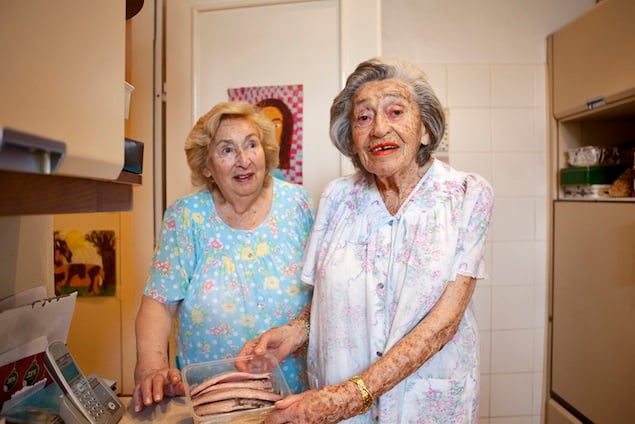Playing Friday, June 22, at 1:15 PM, and Sunday, June 24, at 12:45 PM
Have a sullen, detached, troubled, or rude teenager at home? Care to commiserate with another parent over coffee? This is
the film for you—though you’ll have to supply the coffee, and it won’t be your turn to talk for an hour and a half.
In
Photographic Memory, director
Ross McElwee—best known for the 1986 documentary
Sherman’s March, which won the Grand Jury Prize at
Cannes—offers a self-effacing and sympathetic guide to the trials of
watching a sweet,
companionable child turn into a hostile young adult. His son,
Adrian—whom we see in both the present day and home movies—is
a creative, smart, but angry kid who has managed to finish high
school and is living with his parents and younger sister.
A writer, videographer, and extreme skier (among other
talents), Adrian nevertheless seems to have no direction or interest
in college when the film begins. In an effort to understand his
son, McElwee undertakes a journey into his own past “to try
to remember what it was like to be in my twenties and have most
of my life ahead of me, as Adrian has now.”
Armed with journals, photographs, and a sketchy memory, he
travels to the French town of St. Quay, in Brittany, where he lived
for a year in the early ’70s. In addition to his existential
project, he’s searching for two people he remembers only by first
name and with whom he’s lost touch: Maurice, a photographer who
hired McElwee as an assistant when he saw the young American
taking pictures in a cafe, and Maud, a produce seller who
became his lover. The first relationship ended abruptly with an
unfounded accusation by his boss, the second with McElwee’s
departure on a leg of his trip that didn’t include Maud.
After some effort, McElwee tracks down Maurice’s
ex-wife as well as his own former girlfriend. Through the wife, Hélène,
we
learn some of the truth behind Maurice’s firing of McElwee. For
her part, the now-sixtyish Maud proves a warm though reserved
host, reminiscing with McElwee over home-cooked frogs’ legs.
The whole thing feels a little anticlimactic, like Hercule Poirot
following a series of juicy clues only to discover that the
victim died of natural causes.
All the while, the film goes back and forth between
France and McElwee’s relationship with his son—including video chats,
home movies both recent and past, and narration. Amid the
banalities (“I love my son, but sometimes he drives me crazy”; “How
did I get to be this old?”) are some astute insights. In
observing that the child who was so lovable is always present in
even the most difficult adolescent, McElwee says, “Teenagers
don’t realize how much they’re protected by a younger version
of themselves, which rises up to defend them.”
In the end, I couldn’t help thinking there’s simply a
fundamental difference between McElwee and his son that no rooting
around
in old journals or flights to France can change: Forty years
ago, McElwee was curious, open to adventure, and, by his own
admission, romantic as he traveled through a foreign landscape.
His son suffers, for the time being, from an unhappiness in
his soul that has kept him idling (and emitting noxious fumes).
Ross was Ross, and Adrian is Adrian. We’re left in an inconclusive
state, as is the director—and the dad.
On the bright side, life has a tendency to keep rolling after the camera stops.
—WILLIAM O’SULLIVAN
Plimpton! Starring George Plimpton As Himself
Playing Thursday, June 21, at 8:30 PM, and Saturday, June 23, at noon
Whether you’ve glimpsed him on film, read his work in print, or perused the venerable
Paris Review, it’s likely you’ve heard of
George Plimpton. Part erudite intellectual WASP, part quixotic truth-seeker, Plimpton, the subject of
Plimpton! Starring George Plimpton As Himself, lived with a joie de vivre friends and colleagues found infectious—and which directors
Tom Bean and
Luke Poling accurately capture in this fun-filled romp through the high points of Plimpton’s fabled career.
With narration by the title character himself (Plimpton died in 2003 at the age of 76), as well as snippets and observations
from an impressive roster of those who knew him well—from
Gay Talese and
James Lipton to
Graydon Carter,
Hugh Hefner,
Joe Schmidt, and
Albert Maysles—the film documents Plimpton’s varied and impressive career. Starting in Paris, we watch the young George, the son of well-to-do
parents, make his mark as the preeminent interviewer of literary icons, establishing the
Paris Review as one of the most influential magazines
of its day. Plimpton’s Q&As with the 20th century’s most important
writers (Philip
Roth, Terry Southern, T.S. Eliot, Joan Didion, Ernest
Hemingway, Truman Capote, and Vladimir Nabokov, to name just a few)
not only earned him accolades—Hemingway said of Plimpton, “This
kid is the real deal”—but they started him on a career trajectory
as a collector of life experiences: From Paris, Plimpton went
back to New York, which led to successful stints as a
Sports Illustrated writer, author, bit-part actor, and professional hobnobber.
One of the best aspects of this jovial documentary is
that we get to see Plimpton undertake these sometimes odd and often
ridiculous jaunts through participatory journalism. Here he is
on the flying trapeze, there he is as a cowboy in a John Wayne
Western; he pops up playing the triangle with the New York
Philharmonic, in the boxing ring with Archie Moore, QBing for the
Detroit Lions. It’s a never-ending stream of Plimpton foibles
and frolics, all done to feed the genius storytelling skills
of this universal amateur.
The clips of speeches, party shots, and archival TV
footage lend themselves nicely to understanding the richness and
diversity
of Plimpton’s world, which is peppered with a very Forrest
Gump-ian series of historic coincidences. Perhaps one of the less
successful elements of
Plimpton! is the underlying question as to whether
Plimpton struggled with being taken seriously among his intellectually
superior
clique; whether his set-up-fail, set-up-fail cycle of gaffes
wounded his Harvard-educated mind and made him secretly envious
of a life that could have included more intelligent pursuits.
His old friends and various interviewees speculate that it did.
But watching the film, quite frankly, it appears he doesn’t
really care. For Plimpton, life was more a Technicolor reel of
adventure and surprise, a “who knows” dive into the happy
abyss.
—KATE BENNETT
Playing Thursday, June 21, at 7 PM and Saturday, June 23, at 10 AM
The creative-writing adage “Write what you know” could apply just as well to aspiring documentary filmmakers. In both cases,
what you know can lead to what you don’t—and that’s where it gets good.
Such is the case with
Oma & Bella, a modest 75-minute film, in German with subtitles, by
Alexa Karolinski—a 2011 graduate of New York’s
School of Visual Arts—about her grandmother, Regina (a.k.a. Oma, German
for Grandma) and her
friend Bella. The two eightysomething Holocaust survivors have
shared a Berlin apartment ever since Bella moved in to help
Regina after a hip operation.
We see the women cooking, telling stories, shopping at
the market, cooking, visiting a cemetery, offering tastes to the
director,
cooking, getting their hair done . . . did I mention cooking?
There’s a lot of it, and you wonder who’s eating all this food—whole
chickens, pigs’ feet (I think), cabbage, fruit compote,
cookies, blintzes—made by two elderly women with such quiet lives.
But does it matter? This isn’t a movie about food. It’s about
what Oma and Bella share, which appears to be almost everything.
I’ve seen few depictions of friendship as matter-of-factly lovely as
Oma & Bella: the pair walking side by side into a
beer garden for an afternoon glass of Berliner Weisse; Bella insisting
the trash bags
are too heavy for Regina to carry by herself and toddling after
her to relieve her load; Regina gently putting drops in her
friend’s eyes.
The fact that these two Jews are survivors of the
worst atrocity of the 20th century—Regina born in Poland, Bella in
Lithuania,
both sent to concentration camps as teenagers—might lead you to
expect an hour-plus of tears, bitterness, or Nazi horror.
But this film builds so subtly that you might wonder whether
it’s going to have a climax.
There are certainly dark notes: While Bella’s marriage
was happy (of her husband, she says, “You can’t believe that it was
this wonderful once upon a time. . . . There’s so much love in
this picture”), Oma tore her unfaithful husband’s face out
of photos. Memories of going out and having fun every night as
young women are tempered by the fact that as adolescents they
did anything but—Regina was 12 when war broke out, in a camp by
14.
But two moments late in the film make the audience—and
director—really sit up. In the first, Bella suggests that after being
released from the camps, some survivors exacted revenge.
Keeping the extent of her participation vague, she recalls: “The
Russians liberated us and said, ‘You have two days to do
whatever you want. Then comes normal life.’”
A few minutes later, Bella tries to remember a dream, and just when you think she’s going to trail off, she begins telling
the riveting, chilling, and utterly unexpected story of her father’s death. For the first time, we see tears.
Oma and Bella is a film of the quotidian. But there’s nothing quotidian about what these two have endured. At a large Shabbat dinner they
host (so
that’s what all the food is for), a simple toast sums up the admiration you’ll feel at the end: “To Oma and Bella!”
—WILLIAM O’SULLIVAN


















